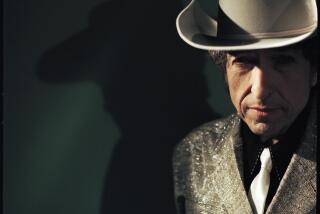Bobby ‘Blue’ Bland dies at 83; influential blues singer
When blues singer Bobby “Blue” Bland was inducted into the Rock and Roll Hall of Fame in 1992, his longtime friend B.B. King, considered one of the most successful and influential blues singers of the 20th century, praised Bland not just for the blues recordings he’d been making for decades, but he also added, “There’s no better singer in any genre.”
Bland, who died Sunday at 83 at his home in Memphis, Tenn., of complications from an ongoing illness, never achieved the broad-based recognition of fellow blues musicians such as King, Muddy Waters and Lightnin’ Hopkins. But he was lauded almost universally by blues enthusiasts for his vocal mastery that spanned the gamut from throat-searing growls to gossamer sighs throughout an up-and-down career that ran more than 60 years.
“I often joke that people can sit around in bars all night arguing over who the greatest blues instrumentalists are,” Jay Sieleman, president and chief executive of the Memphis-based Blues Foundation, said Monday. “But if they’re talking about the greatest blues singers, they wouldn’t get past the first beer without mentioning Bobby ‘Blue’ Bland.”
Best known for hits including “Farther Up the Road,” “Turn On Your Love Light,” “I Pity the Fool” and “Stormy Monday Blues,” Bland carved out a distinctive niche that bridged the gap between earthy rural blues singers such as Robert Johnson, Charley Patton and Muddy Waters and more urbane jazz vocalists like Nat King Cole and Charles Brown, prizing meticulous diction as much as soul-wrenching emotion.
He’s been cited as an important influence by many blues, rock and pop singers and groups who followed, notably Van Morrison, Eric Clapton and the Band. Even B.B. King, for whom Bland once worked as a driver before his own career took off, has said if there were another singer he could sing like, it would be Bland.
He placed more than 60 singles on the R&B charts over a near-three decade span from 1957 to 1985, the majority of them making it to the Top 30. The bouncy, gospel-inflected “Turn On Your Love Light” was subsequently recorded by dozens of other artists, including Jerry Lee Lewis, the Righteous Brothers, Delbert McClinton, James Cotton, the Sir Douglas Quintet and the Grateful Dead, but it was Bland’s definitive recording that was voted into both the Grammy Hall of Fame and the Rock and Roll Hall of Fame.
“He was such an inventive singer,” said Lauren Ontkey, the rock hall’s vice president of education and public programs. “He sang real hard blues but also had this incredible melodic sense and could sing around a really snarly guitar as well as around a string section.”
Robert Calvin Bland was born an only child on Jan. 27, 1930, in Rosemark, Tenn., about 25 miles northeast of Memphis. He was raised by his mother, and did not meet his father until after he became famous.
As a youth he began singing with the gospel group the Miniatures, and gravitated to Memphis where he started hanging out with King, Herman “Little Junior” Parker and other musicians who frequented the clubs on Beale Street.
Referring to King, Bland once told the Washington Post, “He’d let me hang around and get some kind of experience. I drove his car; I did anything I could to get my foot in the door. He gave me the opportunity and I still thank him today.”
That scene in Memphis gave rise to a group of musicians who began performing and touring together under the name “the Beale Streeters,” with Bland among their ranks.
He recorded in the early ‘50s for producer Sam Phillips’ Sun Records label, several years before Phillips launched the careers of Elvis Presley, Jerry Lee Lewis, Johnny Cash and Carl Perkins, but those records didn’t generate much attention beyond Memphis.
Bland found a style of his own after having his musical career interrupted by a three-year stint in the U.S. Army. Having been exposed to smoother West Coast-based singers including Cole and Brown, Bland incorporated their suave sophistication with the grittier style he’d grown up with.
Emerging from the military just as rock ‘n’ roll was starting to explode, Bland began to hit his stride, establishing his name at Duke Records in 1957 with “Farther Up the Road,” which went to No. 1 on Billboard’s R&B chart and reached No. 43 on the overall pop listing.
He struggled with alcohol dependence in the late ‘60s and early ‘70s, but eventually recovered. He remained popular among longtime blues and R&B audiences and toured regularly until recently, when health issues forced him to cut back.
One possible reason Bland never received the kind of recognition beyond blues circles accorded King, Waters and John Lee Hooker was that he wasn’t a guitarist.
“In this day and age,” the Blues Foundation’s Sieleman said, “I think it’s easy to overlook people who just sing. The guitar has become such a prominent part of our musical culture [in the blues]. But the more you listen to Bobby, the more you appreciate the phrasing, the way he could deliver a song. They call him the Frank Sinatra of the impeccable phrasing and what he could do with a song.”
Bland was given a Grammy Lifetime Achievement Award in 1997 and selected for the Blues Foundation’s Hall of Fame in 1981.
He is survived by his wife, Willie, two children and four grandchildren.
Twitter: @RandyLewis2
More to Read
Start your day right
Sign up for Essential California for the L.A. Times biggest news, features and recommendations in your inbox six days a week.
You may occasionally receive promotional content from the Los Angeles Times.






